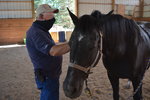
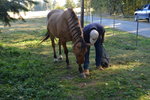
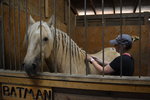
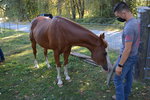
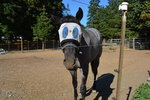
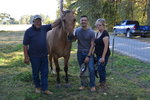
For the past five years, WindHaven Therapeutic Riding Program and those that run it have been helping veterans in the community heal from trauma. Focusing on those with post traumatic stress disorder (PTSD) and traumatic brain injury (TBI), WindHaven helps heroes heal through equine therapy.
Denice Larson-Morrison came up with the idea for the program after spending over two decades as an emergency room and trauma nurse. At her job, Larson-Morrison would see veterans in the hospital on a multitude of medications to help with their PTSD and think to herself that there had to be another way to help.
Helping the community and working with veterans runs deep in the family line. Denice herself served as a United States Navy Corpsman. Rodger Morrison, Denice’s husband, served in the United States Army. Each of their three sons spent time serving in the military and their middle son, Zachary Larson, is still in the Middle East. “For our family (joining the military) was kind of a tradition,” Gabriel Larson, who spent time in the Army Reserves, explained. “It was something that allowed us to feel that we could give back.”
Now, the family is continuing to give back through their therapeutic riding program which helps veterans overcome the complications of PTSD and TBI through equine communication. According to Larson-Morrison, the reactive operating process of the brain is made up of five layers: reflective (fight or flight), movement, emotion and thinking and reasoning. Those without PTSD can react to an event using emotion and thinking/reasoning to determine the best course of action. However, veterans and others with PTSD are “stuck” in the first two stages and react using only fight or flight and movement. Building an emotional communication with the horse helps create pathways in the brain to the upper levels and allows the person to respond to events with reasoning and emotion.
“The most common complaint by someone new in the program is ‘the horse doesn’t like me,’” Rodger said. “The fact is, some people will have to make changes in how they approach the horse and present themselves with the horse. Horses can sense your presence. As they (the veterans) begin in their small steps to make themselves more likeable to the horse, the horse responds to them.”
Rodger explained that building this communication with the horse helps the veterans in their everyday human-to-human relationships. Because horse’s reflect the emotions you show them, if a person approaches it with stress and anxiety, the horse will become stressed and anxious. Once a person sees this, they can begin to change their reactions and presence which helps them in their relationships with friends and family.
The program is about 12 weeks long and free to veterans that wish to apply. In one of the first lessons, WindHaven starts by teaching how to groom a horse. Rodger said that most veterans starting off in the program groom much too fast and stress the horse out. The program teaches them to approach the equine slowly, do a cowboy handshake and go into a slow grooming routine. By the end of the program, veterans have built an emotional connection with the horse and can walk it through routines such as a small obstacle course.
According to Rodger, the program also refrains from using terminology that could upset someone with PTSD and never says “you’re doing it wrong.” Because each horse is different, it requires a different form of approach from each person. The difference in personality is another reason WindHaven uses nine of its 13 horses for the program.
Not only does the program help the veteran in their day-to-day communication with others, but many other categories as well. According to survey results provided by WindHaven, 49 veterans over 733 total lessons between 2017 and 2019 showed decreases in anxiety, detachment, pain, irritability and fatigue. Along with this, the same veterans said they had more energy everyday.
Back in March, WindHaven had to shut down its classes due to the coronavirus pandemic. However, the program is back up and running with new health protocols in place. Class sizes are limited to five people total, which includes one instructor, two horse leaders and two veterans. To make up for the smaller classes, WindHaven is holding them more often. The program has also implemented social distancing measures, requiring masks and disinfects all the materials used. “We’ve implemented all the stuff that has been mandated by the state,” Rodger said. “The first two classes back (after the shutdown) have been fantastic. You should’ve seen the smiles on the veterans faces.”
For Rodger, the program is more than just helping out fellow veterans but saving lives. “I can tell you that having saved somebody’s life is a real positive feeling,” he said, mentioning that many program participants have told him the program saved their life.
Because WindHaven is a 501(c)(3) non-profit organization, the program is free of charge to veterans. According to Rodger, veterans from all over the country have applied to the program and WindHaven is a Veterans Affairs (VA) vendor. However, the program relies on donations from the public and volunteers to remain available. If you are interested in becoming a volunteer, donating to the cause or becoming a horse sponsor, visit windhaventherapeuticriding.org/get-involved-1.